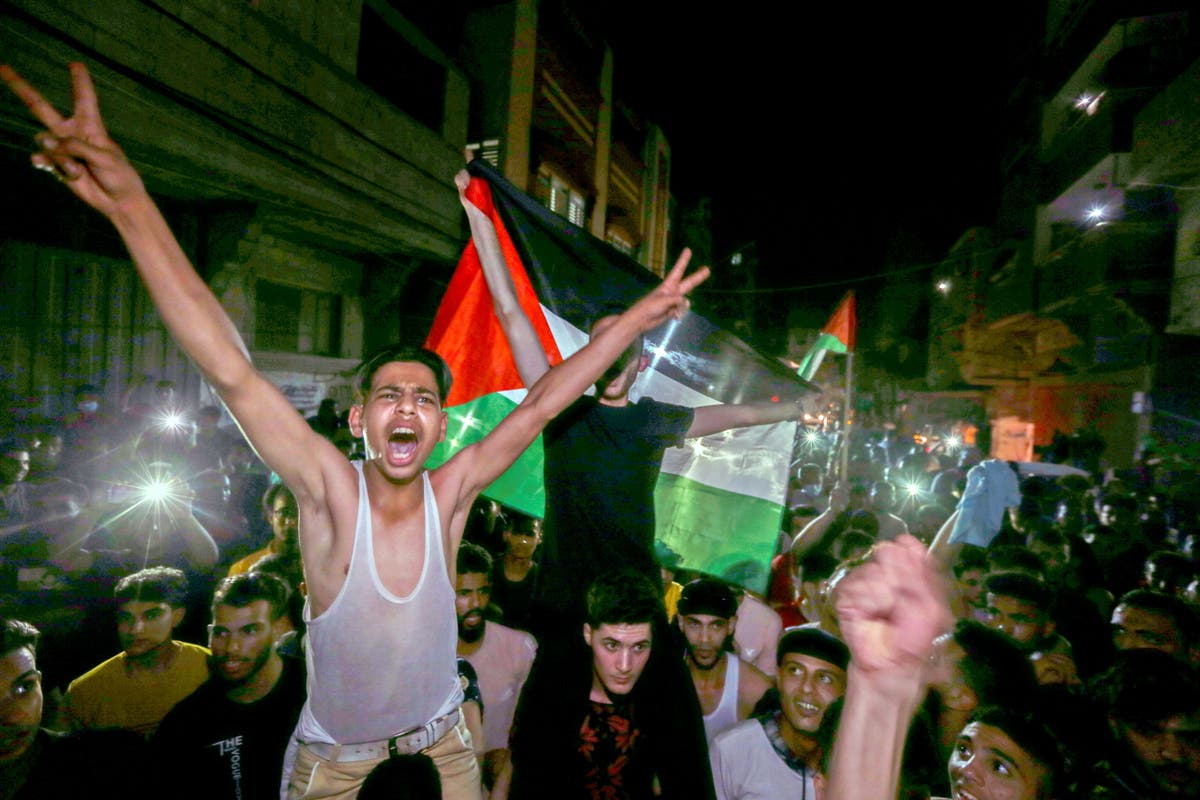Violence at Al-Aqsa mosque just hours after Israel and Hamas announce ceasefire

Fresh violence has broken out at the Al-Aqsa Mosque compound in Jerusalem just 12 hours after a ceasefire was announced to end the conflict between Israel and Gaza.
Israeli security forces fired stun grenades and tear gas at Palestinians shortly after Friday prayers. Palestinians, who were holding a celebratory demonstration at Al-Aqsa and waving Palestinian flags, threw stones at officers.
There was no immediate reports of injuries but security forces arrested a number of Palestinians.
It was not immediately clear what set off the trouble.
Violence at the holy site was a main trigger for the Gaza conflict.
Yussef al-Hassan, a 22 year old student, told The Independent: “This just shows what the Israelis are really like, they talk about peace but at the same time use violence against us.
“This was a peaceful march. When we went to the dome it was surrounded by police, they started pushing us, and when we waved our national flag they used tear gas.”
Ayesha Najjar, 32, one of the many women who took part in the march, said she was tear-gassed when the confrontation began.
“We were not threatening them at all, we were singing and saying some slogans. Then the police came into the compound and started using smoke on us, it got into my eyes and my mouth. ”
A police officer said though they were acting in response.
“This all began because they started throwing stones,” said one police officer. “That is why we had to respond.”
The scenes at Al-Aqsa came after scenes of jubilation in the early hours of Friday as Palestinians in Gaza flocked to the streets in large numbers on news of the ceasefire.
As it came into effect at 2am local time, thousands left their homes, gathering to chant Allahu Akbar (God is the greatest), firing rifles into the air, and singing and dancing for a truce that they claimed as a victory.
Muslims both in Israel and Gaza celebrated last week’s lost Eid al-Fitr by gathering in mosques to offer prayers and meeting at one another’s homes to feast. On 13 May the festival was marked instead by aerial bombardments and clashes with police.
“Today is when Eid al-Fitr begins. Yes, we are sorry and sad for our people who lost their houses and their relatives, but despite that, we will celebrate,” Ahmed Amer, 30, told the Associated Press.
In Tel Al-Hawa in Gaza City, people called out the name of Hamas’s top military commander Deif, who is a prime military target for Israel, chanting “with souls and blood, we redeem you, Deif”.
Egypt had mediated between Israel and Hamas, brokering talks for mediation after 11 days of intense fighting between the two. Israeli prime minister Benjamin Netanyahu’s office announced on Thursday its acceptance of Egypt’s proposal for a “mutual ceasefire without any conditions, which will take effect later”.
People celebrate the ceasefire in Khan Yunis, in the southern Gaza Strip (AFP via Getty Images)
Hamas accepted “mutual and simultaneous” ceasefire but warned it still had its “hands on the trigger”.
The worst violence in years between Israelis and Palestinians ended after close to 250 people were killed on both sides in airstrikes, leaving many injured and a trail of destruction that has turned many major landmarks into rubble.
In Gaza, at least 232 people were killed, including 65 children and 39 women, according to the Gaza health ministry.
People gesture near the rubble of a damaged building as Palestinians celebrate in the streets following a ceasefire in Gaza (REUTERS)
In Israel 12 were killed, including two children and a soldier. The Israeli military said 4,340 rockets were launched at Israel by militants over the course of the 11 days – by far more than the total number of rockets fired during the entire seven-week war in 2014.
Israel struck hundreds of targets in the Gaza Strip, including hospitals, schools, water infrastructure and multi-storey towers housing homes and media offices, drawing fierce international criticism.
Israeli Prime Minister Benjamin Netanyahu said on Friday that the campaign carried out in Gaza was an “exceptional success”.
The decision to call a truce came after international pressure and was welcomed by the UK, US, Pakistan, and other countries as well as the United Nations.
Palestinians celebrate in the streets following a ceasefire, in the southern Gaza Strip (REUTERS)
British foreign secretary Dominic Raab said the “UK continues to support efforts to bring about peace” and welcomes the end of “the unacceptable cycle of violence and loss of civilian life.”
UN Middle East peace envoy Tor Wennesland said: “I welcome the ceasefire between Gaza & Israel. I extend my deepest condolences to the victims of the violence & their loved ones.
“I commend Egypt & Qatar for the efforts carried out, in close contact w/ the @UN, to help restore calm. The work of building Palestine can start.”
Pakistan, an ally of the Palestinians, also welcomed the ceasefire. Foreign minister Shah Mehmood Qureshi called the truce the “power of collective, unified action”.
“This is the effort of every person and every nation, together for a just cause. May this ceasefire be the 1st step towards peace in Palestine,” he added.
Additional reporting by agencies






